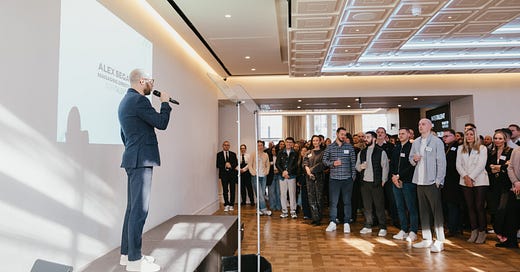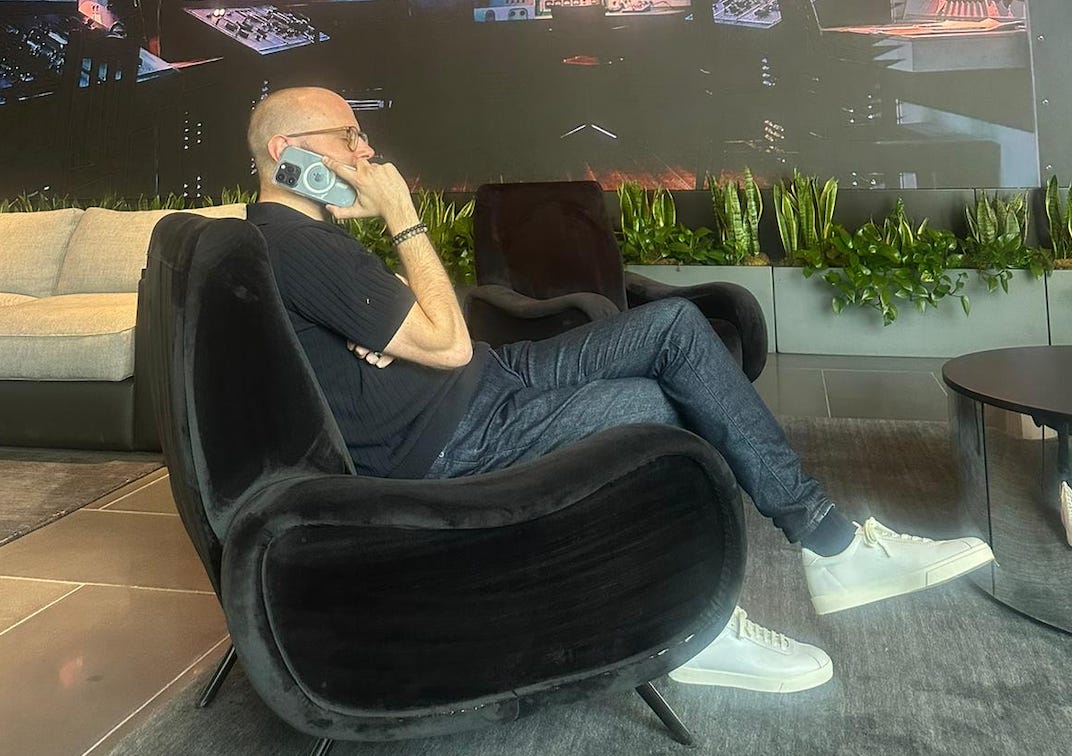I answer your Agent questions... PART TWO!
Alex is the Managing Director of major UK talent agency InterTalent. He represents his clients alongside overseeing the agency's creative strategy, day-to-day operations & acquisitions.
Hi! Please share this post with anyone interested in the inner workings of a Talent Agent. If you are not already a subscriber, please sign up and join everyone who receives Dealmakers straight to their inbox. It’s free, which is not a word that an Agent uses often.
All of my previous blogs about Talent Agents, can be found here.
🤔 I answer your Agent questions… PART TWO!
Thanks to everyone on my LinkedIn who sent in questions a few weeks ago. If you missed the first instalment of my mini Q&A, you can read it here.
If you have a burning question about Talent Agents that you don’t think I’ve covered in my previous blogs, please email me (contact details are at the bottom) and let me know what you would like to see covered.
Ready for Round 2?
Let’s go! ⬇️
Q6: How do you ensure that you stay ahead of the curve with your clients?
I’ve touched on this with a blog post HERE about creating long term success for your clients.
In a nutshell, there are a few ways you can stay ahead of the curve:
Ensure your knowledge is up to date on a daily basis. Things are changing so fast.
Have strong relationships within the industry to learn and bounce ideas off.
Try everything. A few things will pay off and most won’t. No one remembers the stuff that doesn’t work. Bin it. The stuff that does work - push harder at it. Our thought process is to be involved in all worlds, embrace change, try everything and see what unfolds.
Manage your clients expectations better. If they understand the industry like you do, then it’s easier to move them into something that is outside the comfort zone. They understand the logic and strategy if they are switched on and don’t just rely on you.
Q7: If and how are you utilising AI inside your agency?
There are 2 ways I’m looking at AI: the day-to-day use to improve how we effectively we work, and then the big sea change that’s coming for the industry.
In terms of everyday, I am very relaxed about the team using AI to improve their time management and processes. It has to be in moderation and not take over the fundamental elements of why we hired them specifically for the role. From a personal perspective, I use Fyxer (to categorise my hundreds of emails before I get to them - although I refuse to use their automatic ‘draft reply template’), Otter to note-take Zoom calls when appropriate, Chatbots like ChatGPT to answer quickfire questions and Meta AI to do the same when I’m glued to WhatsApp which is where I spend a lot of my working life and Grammarly to ensure my wording is correct. I’m an early adopter so I will try anything but most things aren’t sticking just yet.
In terms of the big sea change of AI coming for our industries, I’m an early adopter here too. We have to embrace change. The train has left the platform so either you’re on it or not. I have no idea what will happen or when, but it will happen, and we will continue to pivot and navigate towards it so long as it is introduced ethically and adds value.
For now, we are ensuring all our clients contracts have an AI clause inserted to make sure we have clarity on how the project will use this technology, if at all.
Q8: When someone lands that first internship, what should they do (besides work hard and be reliable) to make the most of it?
Be irreplaceable. Do more than what’s asked. Doing what is expected is a 3/5 result. Look for where you can add value without the team even knowing they needed it. That will get you a 5/5.
Listen. Ask questions. Show you’re interested. Get involved but don’t be OTT. Put your hand up. Show your work ethic, mentality and determination. You can’t teach those things.
You want to get to a point where they just can’t let you go. They got more than what they asked for. There are lots of 3/5 people who do no more and no less of what’s been given. Go beyond and work yourself into a situation where they can’t let someone else hire you.
Q9: Do you think not starting in London puts you at a disadvantage when it comes to networking and access, or can it offer a different kind of perspective and strength?
This is a really interesting question, and when we put out a job spec I often get great candidates who are based outside of London.
You can operate as a talent agent from anywhere in the world at any time as long as you’re prepared to travel and be where you need to be. You have your phone and a laptop, and in terms of a physical set up you’re good to go. There is an incredible creative community in Manchester, Liverpool, Cardiff, Edinburgh and many other places in the UK where boutique talent agencies are very successful. Furthermore, representing social media talent really does allow you to work from anywhere as the majority of their work can happen anywhere. Our jobs are not specific to location. Content can be made anywhere.
However - London is the second most important creative hub in the world after LA. Everything happens in London and quite literally it’s in between everywhere. While you can build an agency from anywhere, London is the best place to be. It allows you to meet more people, to be in better places, to see more, hear more and do more. If you have the ability to move to London to start a career in this industry I’d do it. It’s not easy financially, of course, but if it’s possible I’d always say yes. Other places can’t compete with what London has to offer your career.
As a talent agency you have to set your own principles as to whether staff need to be London based or remote, and that’s a business decision based on many factors.
Q10: With all the shifts happening in AI, content creation and the rise of micro-influencers, how do you see the role of an agent evolving long term, say in 10 years? And how is InterTalent adapting to stay ahead of that curve?
I see it evolving A LOT. Not too dissimilar from the previous AI question but the only way to stay ahead of the curve is to get involved, do it and see what comes of it. There will always be the need for great talent. There will always be a role for an Agent to play in securing the best opportunities for that talent. Do I think that the things we do will be different in 10 years? Absolutely. Without a doubt. But the function of an agent will remain the same. Don’t let yourself become old fashioned because that can happen quicker than you realise nowadays.
I don’t consider myself old, I’m not 40 yet(!), but when I first started in the industry I was dealing with DVDs and BluRay. I didn’t even have emails on my phone and we used a fax machine. That wasn’t that long ago. Have things changed beyond all recognition? Yes. Is it the same job though? Yes.
📥 I would love to hear from you. Any ideas, thoughts and feedback via alex@intertalentgroup.com are always most welcome.
Please subscribe if you don’t already and tell your friends.
See you next time.
Alex
Need more Dealmakers with Alex Segal? Try some of these…
🤔 What makes a great Talent Agent?
🤔 Should the biggest talent need an Agent?
🤔 What does an Agent actually do?





